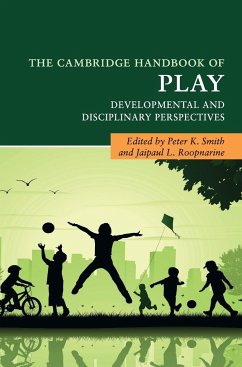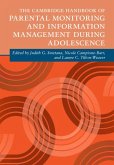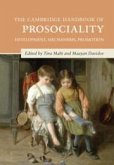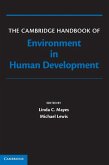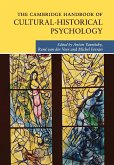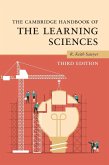The Cambridge Handbook of Play
Herausgeber: Smith, Peter K.; Roopnarine, Jaipaul L.
The Cambridge Handbook of Play
Herausgeber: Smith, Peter K.; Roopnarine, Jaipaul L.
- Gebundenes Buch
- Merkliste
- Auf die Merkliste
- Bewerten Bewerten
- Teilen
- Produkt teilen
- Produkterinnerung
- Produkterinnerung
A comprehensive collection of multidisciplinary perspectives on the forms and functions of play and its importance in development.
Andere Kunden interessierten sich auch für
![The Cambridge Handbook of Parental Monitoring and Information Management during Adolescence The Cambridge Handbook of Parental Monitoring and Information Management during Adolescence]() The Cambridge Handbook of Parental Monitoring and Information Management during Adolescence195,99 €
The Cambridge Handbook of Parental Monitoring and Information Management during Adolescence195,99 €![The Cambridge Handbook of Prosociality The Cambridge Handbook of Prosociality]() The Cambridge Handbook of Prosociality178,99 €
The Cambridge Handbook of Prosociality178,99 €![The Cambridge Handbook of Environment in Human Development The Cambridge Handbook of Environment in Human Development]() The Cambridge Handbook of Environment in Human Development132,99 €
The Cambridge Handbook of Environment in Human Development132,99 €![The Cambridge Handbook of Parenting The Cambridge Handbook of Parenting]() The Cambridge Handbook of Parenting191,99 €
The Cambridge Handbook of Parenting191,99 €![The Cambridge Handbook of Cultural-Historical Psychology The Cambridge Handbook of Cultural-Historical Psychology]() The Cambridge Handbook of Cultural-Historical Psychology62,99 €
The Cambridge Handbook of Cultural-Historical Psychology62,99 €![The Cambridge Handbook of Parental Monitoring and Information Management during Adolescence The Cambridge Handbook of Parental Monitoring and Information Management during Adolescence]() The Cambridge Handbook of Parental Monitoring and Information Management during Adolescence81,99 €
The Cambridge Handbook of Parental Monitoring and Information Management during Adolescence81,99 €![The Cambridge Handbook of the Learning Sciences The Cambridge Handbook of the Learning Sciences]() The Cambridge Handbook of the Learning Sciences190,99 €
The Cambridge Handbook of the Learning Sciences190,99 €-
-
-
A comprehensive collection of multidisciplinary perspectives on the forms and functions of play and its importance in development.
Hinweis: Dieser Artikel kann nur an eine deutsche Lieferadresse ausgeliefert werden.
Hinweis: Dieser Artikel kann nur an eine deutsche Lieferadresse ausgeliefert werden.
Produktdetails
- Produktdetails
- Verlag: Cambridge University Press
- Seitenzahl: 762
- Erscheinungstermin: 18. April 2019
- Englisch
- Abmessung: 250mm x 175mm x 45mm
- Gewicht: 1470g
- ISBN-13: 9781107192515
- ISBN-10: 110719251X
- Artikelnr.: 52713167
- Herstellerkennzeichnung
- Libri GmbH
- Europaallee 1
- 36244 Bad Hersfeld
- gpsr@libri.de
- Verlag: Cambridge University Press
- Seitenzahl: 762
- Erscheinungstermin: 18. April 2019
- Englisch
- Abmessung: 250mm x 175mm x 45mm
- Gewicht: 1470g
- ISBN-13: 9781107192515
- ISBN-10: 110719251X
- Artikelnr.: 52713167
- Herstellerkennzeichnung
- Libri GmbH
- Europaallee 1
- 36244 Bad Hersfeld
- gpsr@libri.de
1. Editorial introduction Peter K. Smith and Jaipaul L. Roopnarine; Part I.
Evolution of Play: 2. New directions in studying the evolution of play
Gordon M. Burghardt and Sergio M. Pellis; 3. The neurochemistry of social
play behaviour in rats Viviana Trezza, E. J. Marijke Achterberg and Louk J.
M. J. Vanderschuren; 4. Fur, fun and future fitness: the evolution of play
in mammals Lynda Sharpe; 5. Nonhuman primate social play: coping with costs
Akie Yanagi and Carol Berman; 6. Evolutionary functions of play: practice,
resilience, innovation, and cooperation Peter Gray; 7. Human-animal play:
play with pets Gail Melson; Part II. Development of Play in Humans: 8.
Infant sensorimotor play: development of socio-cultural competence and
enactive cognition Doris Bergen; 9. Mother-child and father-child play in
different cultural contexts Jaipaul L. Roopnarine, Elif Dede Yildirim and
Kimberly L. Davidson; 10. Object use in childhood: development and possible
functions Tony Pellegrini; 11. Pretend and social pretend play:
complexities, continuities, and controversies of a research field Ageliki
Nicolopoulu; 12. Rough play: past, present and potential Jennifer L. Hart
and Michelle T. Tannock; 13. Playing games with rules in early child care
and beyond Ditte Winther-Lindqvist; 14. Troublesome binaries: playful
learning on screen and off Fiona Scott; 15. Playing and imagining across
the life course: a sociocultural perspective Jennifer A. Vadeboncoeur and
Artin Gönçü; Part III. Historical and Anthropological Context: 16. Play at
play in Western Europe, 1500 and 1800 Linda Pollock; 17. Play in foraging
societies Adam Howell Boyette; 18. Play in South American indigenous
children Yumi Gosso, Briseida D. Resende and Ana M. A. Carvalho; 19. Play
in societies influenced by Confucian values Eunjoo Jung and Sophia Han;
Part IV. Theories of Play and Research Methodology: 20. Classic theories of
play Thomas S. Henricks; 21. Brian Sutton-Smith's views on play Anna
Beresin, Fraser Brown and Michael M. Patte; 22. Methods of studying play
James E. Johnson and Pool Ip Dong; Part V. Play and Learning: 23. Play and
learning in everyday family contexts Marilyn Fleer; 24. Leading children in
their 'leading activity': a Vygotskian approach to play Elena Bodrova,
Deborah J. Leong, Carrie Germeroth and Crystal Day-Hess; 25. The adult as
mediator of development in children's play Pentti Hakkarainen and Milda
Bredikyte; 26. Play, learning and teaching in early childhood education
Niklas Pramling, Anne Kultti and Ingrid Pramling-Samuelson; 27. Toddlers'
play in early childhood education settings Maritta Hännikäinen and Hilkka
Munter; 28. Adult and child learning in playworlds Beth Ferholt, Robert
Lecusay and Monica Nilsson; 29. Play-literacy: knowns and unknowns in a
changing world Kathleen Roskos; 30. The problems of play Susan Engel; Part
VI. Play with Special Groups: 31. Play and children with autism: insights
from research and implications for practice Despina Papoudi and Lila
Kossyvaki; 32. Play and children with sensory impairments P. Margaret Brown
and Anna Bortoli; 33. Play and children with physical impairments Cynthia
J. Cress; 34. A typology of play in medical settings Colleen Baish-Cameron
and Michael M. Patte; 35. Play therapy: theory and practice Elise
Cuschieri; 36. Political violence (war and terrorism) and children's play
Esther Cohen; Part VII. Play Spaces and the Rights of Children: 37. Play
spaces: indoors and out John A. Sutterby; 38. Recess: supporting a culture
of meaningful play at school Lauren McNamara; 39. Playwork: a unique way of
working with children Fraser Brown, Alexandra Long and Mike Wragg; 40. The
right to childhood and the ethos of play Lacey E. Peters and Beth Blue
Swadener.
Evolution of Play: 2. New directions in studying the evolution of play
Gordon M. Burghardt and Sergio M. Pellis; 3. The neurochemistry of social
play behaviour in rats Viviana Trezza, E. J. Marijke Achterberg and Louk J.
M. J. Vanderschuren; 4. Fur, fun and future fitness: the evolution of play
in mammals Lynda Sharpe; 5. Nonhuman primate social play: coping with costs
Akie Yanagi and Carol Berman; 6. Evolutionary functions of play: practice,
resilience, innovation, and cooperation Peter Gray; 7. Human-animal play:
play with pets Gail Melson; Part II. Development of Play in Humans: 8.
Infant sensorimotor play: development of socio-cultural competence and
enactive cognition Doris Bergen; 9. Mother-child and father-child play in
different cultural contexts Jaipaul L. Roopnarine, Elif Dede Yildirim and
Kimberly L. Davidson; 10. Object use in childhood: development and possible
functions Tony Pellegrini; 11. Pretend and social pretend play:
complexities, continuities, and controversies of a research field Ageliki
Nicolopoulu; 12. Rough play: past, present and potential Jennifer L. Hart
and Michelle T. Tannock; 13. Playing games with rules in early child care
and beyond Ditte Winther-Lindqvist; 14. Troublesome binaries: playful
learning on screen and off Fiona Scott; 15. Playing and imagining across
the life course: a sociocultural perspective Jennifer A. Vadeboncoeur and
Artin Gönçü; Part III. Historical and Anthropological Context: 16. Play at
play in Western Europe, 1500 and 1800 Linda Pollock; 17. Play in foraging
societies Adam Howell Boyette; 18. Play in South American indigenous
children Yumi Gosso, Briseida D. Resende and Ana M. A. Carvalho; 19. Play
in societies influenced by Confucian values Eunjoo Jung and Sophia Han;
Part IV. Theories of Play and Research Methodology: 20. Classic theories of
play Thomas S. Henricks; 21. Brian Sutton-Smith's views on play Anna
Beresin, Fraser Brown and Michael M. Patte; 22. Methods of studying play
James E. Johnson and Pool Ip Dong; Part V. Play and Learning: 23. Play and
learning in everyday family contexts Marilyn Fleer; 24. Leading children in
their 'leading activity': a Vygotskian approach to play Elena Bodrova,
Deborah J. Leong, Carrie Germeroth and Crystal Day-Hess; 25. The adult as
mediator of development in children's play Pentti Hakkarainen and Milda
Bredikyte; 26. Play, learning and teaching in early childhood education
Niklas Pramling, Anne Kultti and Ingrid Pramling-Samuelson; 27. Toddlers'
play in early childhood education settings Maritta Hännikäinen and Hilkka
Munter; 28. Adult and child learning in playworlds Beth Ferholt, Robert
Lecusay and Monica Nilsson; 29. Play-literacy: knowns and unknowns in a
changing world Kathleen Roskos; 30. The problems of play Susan Engel; Part
VI. Play with Special Groups: 31. Play and children with autism: insights
from research and implications for practice Despina Papoudi and Lila
Kossyvaki; 32. Play and children with sensory impairments P. Margaret Brown
and Anna Bortoli; 33. Play and children with physical impairments Cynthia
J. Cress; 34. A typology of play in medical settings Colleen Baish-Cameron
and Michael M. Patte; 35. Play therapy: theory and practice Elise
Cuschieri; 36. Political violence (war and terrorism) and children's play
Esther Cohen; Part VII. Play Spaces and the Rights of Children: 37. Play
spaces: indoors and out John A. Sutterby; 38. Recess: supporting a culture
of meaningful play at school Lauren McNamara; 39. Playwork: a unique way of
working with children Fraser Brown, Alexandra Long and Mike Wragg; 40. The
right to childhood and the ethos of play Lacey E. Peters and Beth Blue
Swadener.
1. Editorial introduction Peter K. Smith and Jaipaul L. Roopnarine; Part I.
Evolution of Play: 2. New directions in studying the evolution of play
Gordon M. Burghardt and Sergio M. Pellis; 3. The neurochemistry of social
play behaviour in rats Viviana Trezza, E. J. Marijke Achterberg and Louk J.
M. J. Vanderschuren; 4. Fur, fun and future fitness: the evolution of play
in mammals Lynda Sharpe; 5. Nonhuman primate social play: coping with costs
Akie Yanagi and Carol Berman; 6. Evolutionary functions of play: practice,
resilience, innovation, and cooperation Peter Gray; 7. Human-animal play:
play with pets Gail Melson; Part II. Development of Play in Humans: 8.
Infant sensorimotor play: development of socio-cultural competence and
enactive cognition Doris Bergen; 9. Mother-child and father-child play in
different cultural contexts Jaipaul L. Roopnarine, Elif Dede Yildirim and
Kimberly L. Davidson; 10. Object use in childhood: development and possible
functions Tony Pellegrini; 11. Pretend and social pretend play:
complexities, continuities, and controversies of a research field Ageliki
Nicolopoulu; 12. Rough play: past, present and potential Jennifer L. Hart
and Michelle T. Tannock; 13. Playing games with rules in early child care
and beyond Ditte Winther-Lindqvist; 14. Troublesome binaries: playful
learning on screen and off Fiona Scott; 15. Playing and imagining across
the life course: a sociocultural perspective Jennifer A. Vadeboncoeur and
Artin Gönçü; Part III. Historical and Anthropological Context: 16. Play at
play in Western Europe, 1500 and 1800 Linda Pollock; 17. Play in foraging
societies Adam Howell Boyette; 18. Play in South American indigenous
children Yumi Gosso, Briseida D. Resende and Ana M. A. Carvalho; 19. Play
in societies influenced by Confucian values Eunjoo Jung and Sophia Han;
Part IV. Theories of Play and Research Methodology: 20. Classic theories of
play Thomas S. Henricks; 21. Brian Sutton-Smith's views on play Anna
Beresin, Fraser Brown and Michael M. Patte; 22. Methods of studying play
James E. Johnson and Pool Ip Dong; Part V. Play and Learning: 23. Play and
learning in everyday family contexts Marilyn Fleer; 24. Leading children in
their 'leading activity': a Vygotskian approach to play Elena Bodrova,
Deborah J. Leong, Carrie Germeroth and Crystal Day-Hess; 25. The adult as
mediator of development in children's play Pentti Hakkarainen and Milda
Bredikyte; 26. Play, learning and teaching in early childhood education
Niklas Pramling, Anne Kultti and Ingrid Pramling-Samuelson; 27. Toddlers'
play in early childhood education settings Maritta Hännikäinen and Hilkka
Munter; 28. Adult and child learning in playworlds Beth Ferholt, Robert
Lecusay and Monica Nilsson; 29. Play-literacy: knowns and unknowns in a
changing world Kathleen Roskos; 30. The problems of play Susan Engel; Part
VI. Play with Special Groups: 31. Play and children with autism: insights
from research and implications for practice Despina Papoudi and Lila
Kossyvaki; 32. Play and children with sensory impairments P. Margaret Brown
and Anna Bortoli; 33. Play and children with physical impairments Cynthia
J. Cress; 34. A typology of play in medical settings Colleen Baish-Cameron
and Michael M. Patte; 35. Play therapy: theory and practice Elise
Cuschieri; 36. Political violence (war and terrorism) and children's play
Esther Cohen; Part VII. Play Spaces and the Rights of Children: 37. Play
spaces: indoors and out John A. Sutterby; 38. Recess: supporting a culture
of meaningful play at school Lauren McNamara; 39. Playwork: a unique way of
working with children Fraser Brown, Alexandra Long and Mike Wragg; 40. The
right to childhood and the ethos of play Lacey E. Peters and Beth Blue
Swadener.
Evolution of Play: 2. New directions in studying the evolution of play
Gordon M. Burghardt and Sergio M. Pellis; 3. The neurochemistry of social
play behaviour in rats Viviana Trezza, E. J. Marijke Achterberg and Louk J.
M. J. Vanderschuren; 4. Fur, fun and future fitness: the evolution of play
in mammals Lynda Sharpe; 5. Nonhuman primate social play: coping with costs
Akie Yanagi and Carol Berman; 6. Evolutionary functions of play: practice,
resilience, innovation, and cooperation Peter Gray; 7. Human-animal play:
play with pets Gail Melson; Part II. Development of Play in Humans: 8.
Infant sensorimotor play: development of socio-cultural competence and
enactive cognition Doris Bergen; 9. Mother-child and father-child play in
different cultural contexts Jaipaul L. Roopnarine, Elif Dede Yildirim and
Kimberly L. Davidson; 10. Object use in childhood: development and possible
functions Tony Pellegrini; 11. Pretend and social pretend play:
complexities, continuities, and controversies of a research field Ageliki
Nicolopoulu; 12. Rough play: past, present and potential Jennifer L. Hart
and Michelle T. Tannock; 13. Playing games with rules in early child care
and beyond Ditte Winther-Lindqvist; 14. Troublesome binaries: playful
learning on screen and off Fiona Scott; 15. Playing and imagining across
the life course: a sociocultural perspective Jennifer A. Vadeboncoeur and
Artin Gönçü; Part III. Historical and Anthropological Context: 16. Play at
play in Western Europe, 1500 and 1800 Linda Pollock; 17. Play in foraging
societies Adam Howell Boyette; 18. Play in South American indigenous
children Yumi Gosso, Briseida D. Resende and Ana M. A. Carvalho; 19. Play
in societies influenced by Confucian values Eunjoo Jung and Sophia Han;
Part IV. Theories of Play and Research Methodology: 20. Classic theories of
play Thomas S. Henricks; 21. Brian Sutton-Smith's views on play Anna
Beresin, Fraser Brown and Michael M. Patte; 22. Methods of studying play
James E. Johnson and Pool Ip Dong; Part V. Play and Learning: 23. Play and
learning in everyday family contexts Marilyn Fleer; 24. Leading children in
their 'leading activity': a Vygotskian approach to play Elena Bodrova,
Deborah J. Leong, Carrie Germeroth and Crystal Day-Hess; 25. The adult as
mediator of development in children's play Pentti Hakkarainen and Milda
Bredikyte; 26. Play, learning and teaching in early childhood education
Niklas Pramling, Anne Kultti and Ingrid Pramling-Samuelson; 27. Toddlers'
play in early childhood education settings Maritta Hännikäinen and Hilkka
Munter; 28. Adult and child learning in playworlds Beth Ferholt, Robert
Lecusay and Monica Nilsson; 29. Play-literacy: knowns and unknowns in a
changing world Kathleen Roskos; 30. The problems of play Susan Engel; Part
VI. Play with Special Groups: 31. Play and children with autism: insights
from research and implications for practice Despina Papoudi and Lila
Kossyvaki; 32. Play and children with sensory impairments P. Margaret Brown
and Anna Bortoli; 33. Play and children with physical impairments Cynthia
J. Cress; 34. A typology of play in medical settings Colleen Baish-Cameron
and Michael M. Patte; 35. Play therapy: theory and practice Elise
Cuschieri; 36. Political violence (war and terrorism) and children's play
Esther Cohen; Part VII. Play Spaces and the Rights of Children: 37. Play
spaces: indoors and out John A. Sutterby; 38. Recess: supporting a culture
of meaningful play at school Lauren McNamara; 39. Playwork: a unique way of
working with children Fraser Brown, Alexandra Long and Mike Wragg; 40. The
right to childhood and the ethos of play Lacey E. Peters and Beth Blue
Swadener.

